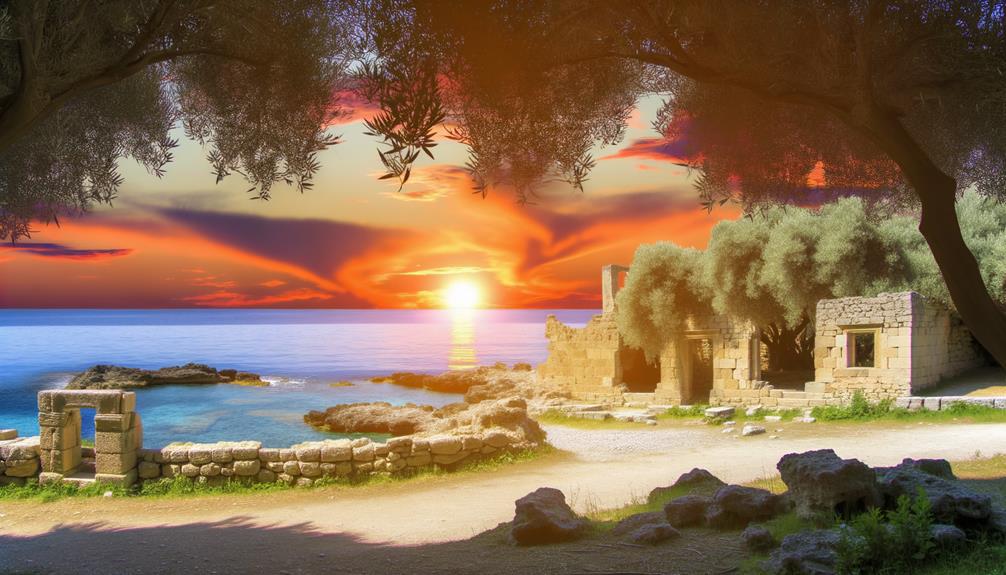Meaning of the Name Rhodes
The name 'Rhodes' derives from the ancient Greek word 'Rhódos,' likely meaning 'rose.' This etymology reflects the island's historical interactions with pre-Greek and non-Indo-European cultures. The term appears in various forms, such as 'Rhodos' in Greek and 'Rhodus' in Latin.
Historically, Rhodes was a significant trade hub and military stronghold. Mythologically, the name is tied to the Sun God Helios, emphasizing its cultural richness.
Additionally, Rhodes features prominently in literature, art, and modern academia through institutions like the Rhodes Scholarship. By understanding these layers, one can appreciate its profound historical and cultural relevance.
Discover more intricate details about Rhodes and its multifaceted significance.

Key Takeaways
- The name 'Rhodes' originates from the ancient Greek word 'Rhódos,' meaning 'rose.'
- It may be derived from a pre-Greek or non-Indo-European substrate, reflecting historical interactions.
- The island of Rhodes is mythologically linked with the Sun God Helios and divine narratives.
- Rhodes signifies a significant historical and cultural hub due to its strategic maritime location.
- The surname 'Rhodes' suggests ancestral ties in English-speaking countries and has various notable personalities associated with it.
Etymology of 'Rhodes'
The etymology of the name 'Rhodes' traces its origins to the ancient Greek word 'Ῥόδος' (Rhódos), which is believed to be derived from the word for 'rose.'
This linguistic connection suggests a vivid cultural and mythological significance, as roses often symbolize beauty and grace in Greek mythology. The phonetic structure of 'Ῥόδος' aligns with other Hellenistic terms, showcasing the fluidity and adaptability of ancient Greek language.
Additionally, the morphological components indicate a possible pre-Greek or non-Indo-European substrate, reflecting the island's complex historical interactions. By examining the lexical and phonological elements, one gains insight into the rich tapestry of influences that shaped the nomenclature, offering a fascinating glimpse into ancient linguistic practices.
Historical Background
Building on the etymological insights, the historical background of Rhodes reveals a tapestry of cultural interactions and geopolitical significance that shaped the island's legacy.
Located at the crossroads of the Aegean and Mediterranean seas, Rhodes has been a nexus for trade and cultural exchange since antiquity. The island was successively influenced by the Minoans, Mycenaeans, and Dorians, each leaving indelible marks on its cultural fabric.
The establishment of the city-state of Rhodes in 408 BC heralded a period of prosperity and political clout. Subsequently, the island came under the sway of the Roman and Byzantine empires, later becoming a stronghold of the Knights Hospitaller.
Each epoch contributed layers of complexity to Rhodes' historical narrative, enriching its identity.
Mythological Connections
The mythological connections of the name Rhodes are deeply intertwined with the island's origins and its association with the Sun God Helios. According to legend, the island emerged from the sea as a gift to Helios, who subsequently became its patron deity and gave it an everlasting radiance.
This divine connection was immortalized by the construction of the Colossus of Rhodes, a monumental statue symbolizing both the island's grandeur and its sacred bond with the sun god.
Island of Rhodes Origins
Rooted in ancient mythology, the origins of the Island of Rhodes are intricately linked to tales of divine intervention and celestial beings. According to Hellenic lore, the island emerged from the union of the sea god Poseidon and the nymph Rhodes. This myth encapsulates the island's divine birthright, suggesting an inherently sacred geography.
The etymology of 'Rhodes' itself might derive from the Greek word 'rhodon,' meaning rose, symbolizing beauty and divine favor. These mythological narratives not only provide a sacred context but also imbue the island with a rich cultural identity. Such stories articulate a linguistic and symbolic framework that perpetuates Rhodes' historical and spiritual significance, underpinning its place in both mythology and ancient maritime traditions.
Sun God Helios
As the patron deity of Rhodes, the Sun God Helios stands as a central figure in the island's mythological heritage, embodying both solar power and divine radiance. Helios, often depicted driving a chariot across the sky, symbolizes light, vision, and knowledge.
The etymological connections between Rhodes and Helios are profound, with the island's name possibly derived from 'rhodon,' meaning rose, linking to the myth that the island emerged from the sea, kissed by the sun's rays. Linguistically, Helios' association with Rhodes underscores themes of enlightenment and essentiality.
His divine guardianship is reflected in literary and archaeological evidence, illustrating a symbiotic relationship where the island venerates Helios, affirming its identity through his celestial influence.
Colossus of Rhodes
Erected as a monumental tribute to Helios, the Colossus of Rhodes not only represented the island's devotion to their patron deity but also symbolized the convergence of myth, art, and engineering in ancient Hellenistic society.
This towering statue, crafted by Chares of Lindos around 280 BCE, stood approximately 33 meters high, embodying the island's resilience and triumph over adversity, particularly their victory against Demetrius I of Macedon.
Linguistically, the term 'Colossus' itself has roots in the Greek word 'Kolossos,' indicating something of enormous size and grandeur. The statue's mythological connections underscore the significance of Helios as a protector and benefactor, intertwining religious reverence with artistic expression, thereby elevating Rhodes' cultural and historical identity.
Geographical Significance
The name 'Rhodes' is intrinsically linked to its ancient Greek origins, reflecting the island's historical and cultural heritage.
Situated in the southeastern Aegean Sea, the island of Rhodes has long been recognized for its strategic maritime location, serving as a pivotal nexus for trade and military endeavors.
This geographical positioning not only facilitated economic prosperity but also underscored its significance in broader geopolitical dynamics throughout history.
Ancient Greek Origins
Rhodes, an island located in the southeastern Aegean Sea, derives its name from the ancient Greek word 'rhodon,' meaning rose, signifying its historical and geographical importance in ancient Greek civilization.
The etymology reflects both the island's natural beauty and its crucial role as a maritime hub. Linguistically, 'rhodon' encapsulates the island's lush flora, which the ancients revered.
Geographically, Rhodes was strategically positioned along essential maritime routes, linking Greece with Asia Minor and the broader Mediterranean. This confluence of natural allure and strategic significance fostered Rhodes' development into a prominent cultural and economic center.
Therefore, the name 'Rhodes' not only identifies a location but also encapsulates its historical essence and enduring legacy in ancient Greek history.
Island of Rhodes
Situated at the crossroads of major maritime routes, the island of Rhodes holds significant geographical importance due to its strategic location in the southeastern Aegean Sea. This positioning has historically rendered Rhodes a crucial nexus for trade, cultural exchanges, and military operations.
The island's terrain is characterized by a diverse topography, including mountainous regions and fertile plains, which support a variety of agricultural activities. The coastline, punctuated by numerous natural harbors, has facilitated maritime navigation and the establishment of thriving port cities.
Moreover, Rhodes' proximity to both the Greek mainland and the coast of Asia Minor underscores its role as a linchpin in regional dynamics, influencing economic, political, and social interactions across the Mediterranean basin.
Strategic Maritime Location
Historically pivotal due to its location, Rhodes' strategic maritime position in the southeastern Aegean Sea has profoundly influenced its role in facilitating trade, cultural exchanges, and military operations throughout the Mediterranean. This island has served as a critical nexus, connecting various civilizations and fostering economic prosperity. Its harbors provided safe anchorage and a gateway for merchants and navies alike.
| Aspect | Significance |
|---|---|
| Trade Routes | Central hub for Mediterranean trade networks |
| Cultural Exchange | Confluence point for diverse cultural interactions |
| Military Operations | Key naval base for various empires, including the Byzantine and Ottoman |
| Economic Prosperity | Flourished as a commercial center due to strategic location |
Rhodes' geographical significance remains a tribute to its enduring legacy as a linchpin in maritime history.
Cultural Impact
The name 'Rhodes' carries a profound cultural resonance, intertwining its historical legacy with contemporary linguistic and societal influences. Its rich cultural tapestry is evident in various domains:
- Literature: The name appears in classical and modern works, symbolizing strength and resilience.
- Art: The image of the Colossus of Rhodes has inspired numerous artistic representations, embodying grandeur and human achievement.
- Education: Renowned academic institutions and scholarships, such as the Rhodes Scholarship, perpetuate its legacy of intellectual excellence.
- Tourism: Modern tourism on the island of Rhodes thrives, drawing from its storied past and scenic beauty.
- Cinema and Media: The name features prominently in films and documentaries, often evoking themes of adventure and historical intrigue.
These cultural facets underscore the enduring significance of 'Rhodes' in contemporary society.
Linguistic Variations
Among the multifaceted cultural influences, the name 'Rhodes' also manifests in diverse linguistic variations that reflect its broad geographic and historical reach. In Greek, 'Rhodos' signifies the island, with roots tracing back to 'rhodon,' meaning 'rose,' highlighting its ancient heritage.
The Latin adaptation 'Rhodus' preserved this connection, spreading through Roman influence. In English, 'Rhodes' remains phonetically faithful to its origins, while in Italian, 'Rodi' exhibits a regional adaptation. These variations underscore the name's adaptability and enduring presence across languages.
Additionally, the surname 'Rhodes' in English-speaking countries often signifies ancestral ties to the island, exemplifying how linguistics intertwine with cultural identity. This linguistic diversity elucidates the name's profound historical and cultural significance.
Famous Personalities
Renowned individuals bearing the name 'Rhodes' have made notable contributions across various fields, reflecting the name's pervasive influence and historical resonance. This illustrious surname has been associated with a variety of impactful figures, each leaving an indelible mark on their respective domains.
- Cecil Rhodes: A British imperialist, businessman, and founder of the De Beers diamond company, his legacy is both celebrated and controversial.
- Dusty Rhodes: An iconic professional wrestler known for his charisma and influence in the wrestling world.
- Zandra Rhodes: A pioneering British fashion designer, renowned for her bold textile designs.
- Nick Rhodes: A founding member of the influential band Duran Duran, contributing notably to the music industry.
- Linda Rhodes: An acclaimed author and expert in eldercare and health issues.
Modern Usage
In contemporary contexts, the name 'Rhodes' has transcended its historical and cultural roots, finding relevance in a diverse array of modern applications and identities. In academia, Rhodes Scholars represent the pinnacle of educational achievement. In geography, Rhodes Island remains a cherished travel destination. Additionally, the name appears prominently in entertainment, with actors and characters bearing the name in various media.
| Domain | Modern Significance |
|---|---|
| Education | Rhodes Scholars symbolize academic excellence |
| Geography | Rhodes Island is a popular tourist destination |
| Entertainment | Characters and actors named Rhodes |
This linguistic versatility demonstrates the name's capacity to adapt and flourish across different sectors, reflecting its enduring legacy and contemporary resonance.
Conclusion
The name 'Rhodes' encompasses a rich tapestry of historical, mythological, and cultural significance. One poignant statistic highlights its enduring legacy: the island of Rhodes, with its ancient and medieval heritage, attracts over 1.5 million tourists annually, underscoring its lasting allure.
This multifaceted name reflects not only geographical importance but also linguistic diversity and cultural impact, making it a subject of profound academic interest and continued relevance in modern contexts.






